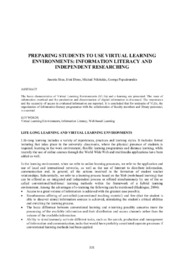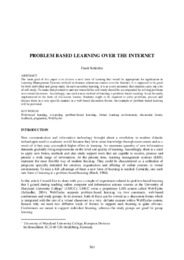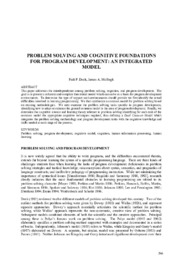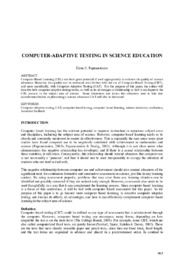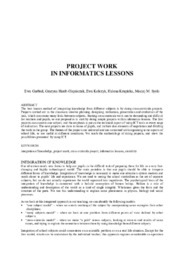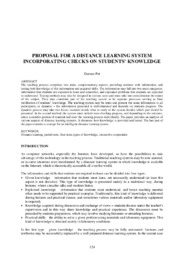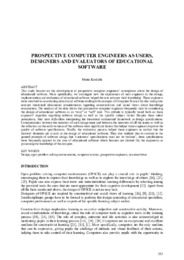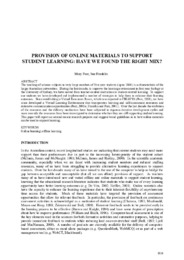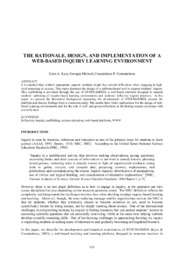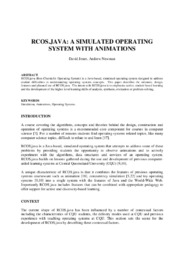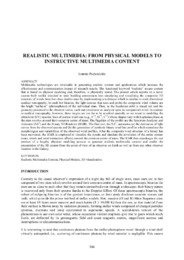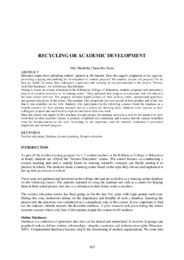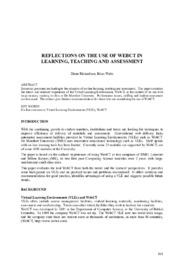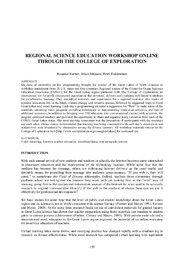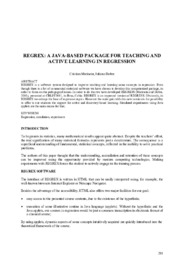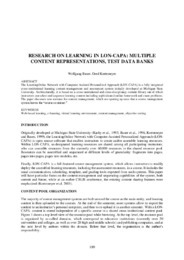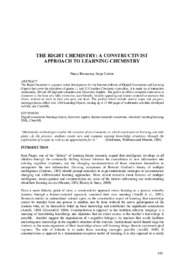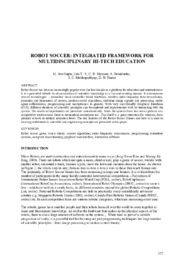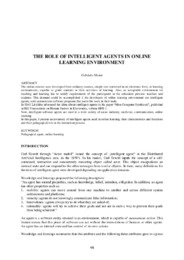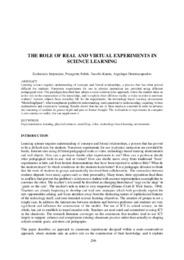Browsing Computer Based Learning in Science (CBLIS) by Title
Now showing items 227-246 of 337
-
Preparing students to use virtual learning Environments: information literacy and Independent researching
(University of Cyprus, 2007)The basic characteristics of Virtual Learning Environments (VLEs) and e-learning are presented. The issue of information overload and the production and dissemination of digital information is discussed. The importance and ... -
Problem based learning over the internet
(University of Zilina, 2005)The main goal of this paper is to discuss a new form of learning that would be appropriate for application in Learning Management Systems utilized in distance education courses over the Internet. It is supposed to be good ... -
Problem solving and cognitive foundations for program development: an integrated model
(Department of Educational Sciences, University of Cyprus, 2003)This paper addresses the interdependence among problem solving, cognition, and program development. The goal is to present a coherent and complete theoretical model which can serve as a basis for program development ... -
Productive face-to-face interview
(Department of Educational Sciences, University of Cyprus, 2003)Computer Based Learning (CBL) can have great potential if used appropriately to enhance the quality of science education. However, this quality can be enhanced even further with the use of Computer Based Testing (CBT), and ... -
Project work in informatics lessons
(Pedagogical Faculty of University of Ostrava, 2001)The best known method of integrating knowledge from different subjects is by doing cross-curricula projects. Projects carried out in the classroom involve planning, designing, realisation, presentation and evaluation of ... -
Proposal for a Distance Learning System Incorporating Checks on Students’ Knowledge
(University of Zilina, 2005)The teaching process comprises two main, complementary aspects: providing students with information, and testing both knowledge of this information and acquired skills. The information may fall into two main categories: ... -
Prospective computer engineers as users, designers and evaluators of educational software
(Department of Educational Sciences, University of Cyprus, 2003)This study focuses on the development of prospective computer engineers’ conceptions about the design of educational software. More specifically, we investigate how the experiences of such engineers in the design, ... -
Provision of online materials to support student learning: have we found the right mix?
(Department of Educational Sciences, University of Cyprus, 2003)The teaching of science subjects to very large numbers of first year students (up to 1800) is a characteristic of the larger Australian universities. During the last decade, to improve the learning environment in first ... -
The rationale, design, and implementation of a web-based inquiry learning environment
(University of Cyprus, 2007)It is reported that, without appropriate support, students might face several difficulties when engaging in highlevel reasoning in science. This paper discusses the design of a software-based tool to support students’ ... -
Rcos.java: a simulated operating system with animations
(Pedagogical Faculty of University of Ostrava, 2001)RCOS.java (Ron Chernich's Operating System) is a Java-based, simulated operating system designed to address student difficulties in understanding operating systems concepts. This paper describes the rationale, design, features ... -
Realistic multimedia: from physical models to Instructive multimedia content
(University of Cyprus, 2007)Multimedia technologies are invaluable in generating realistic content and applications which increase the effectiveness and communication impact of research results. The functional keyword “realistic” means content that ... -
Recycling or academic development
(University of Zilina, 2005)Educators argue about uploading students’ projects to the Internet. Does this support plagiarism or the opposite, preventing copying and enabling the development of student projects? Do students recycle old projects? Or ... -
Reflections on the use of webct in Learning, teaching and assessment
(Department of Educational Sciences, University of Cyprus, 2003)Economic pressures are leading to the adoption of on-line learning, teaching and assessment. This paper considers the tutors' and students' experience of the Virtual Learning Environment, WebCT, in the context of its use ... -
Regional science education workshop online through the college of exploration
(University of Cyprus, 2007)Six days of interactive on-line programming brought the science of the Great Lakes of North America to workshop participants from 20 U.S. states and four countries. Regional leaders of the Center for Ocean Sciences Education ... -
Regrex: a java-based package for teaching and active learning in regression
(Department of Educational Sciences, University of Cyprus, 2003)REGREX is a software system designed to improve teaching and learning some concepts in regression. Even though there is a lot of commercial statistical software we have chosen to develop this computerized package, in order ... -
Research on learning in lon-capa: multiple content representations, test data banks
(University of Zilina, 2005)The LearningOnline Network with Computer-Assisted Personalized Approach (LON-CAPA) is a fully integrated cross-institutional learning content management and assessment system initially developed at Michigan State University. ... -
The right chemistry: a constructivist approach to learning chemistry
(Department of Educational Sciences, University of Cyprus, 2003)The Right Chemistry is a project under development for the Internet delivery of Digital Courseware and Learning Objects that cover the objectives of grades 11 and 12 Canadian Chemistry curriculum. It is made up of interactive ... -
Robot soccer: integrated framework for Multidisciplinary hi-tech education
(Department of Educational Sciences, University of Cyprus, 2003)Robot Soccer has become increasingly popular over the last decade as a platform for education and entertainment. It is a powerful vehicle for dissemination of scientific knowledge in a fun and exciting manner. It encompasses ... -
The role of intelligent agents in online learning environment
(University of Zilina, 2005)The online courses were developed from ordinary courses, simple text converted in an electronic form, to learning environments, capable to guide students in their activities of learning. Also, an acceptable environment for ... -
The role of real and virtual experiments in science learning
(University of Zilina, 2005)Learning science requires understanding of concepts and formal relationships, a process that has often proved difficult for students. Numerous experiments for use in physics instruction are provided using different pedagogical ...
